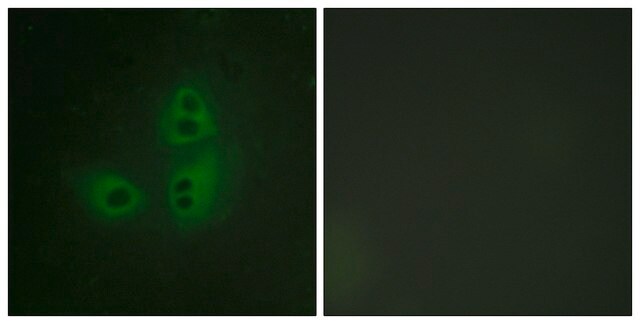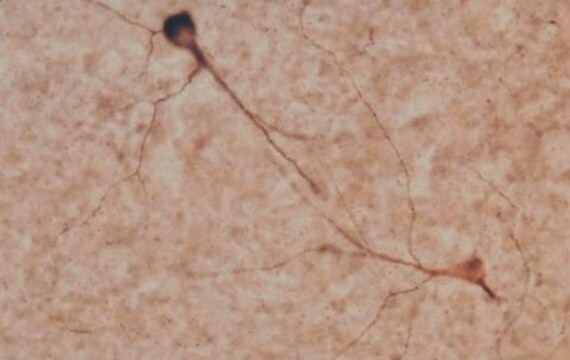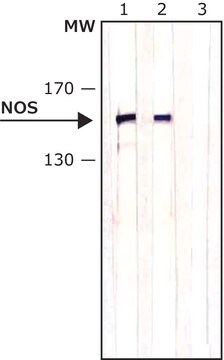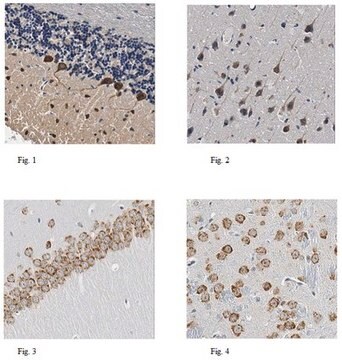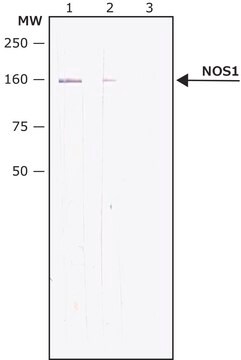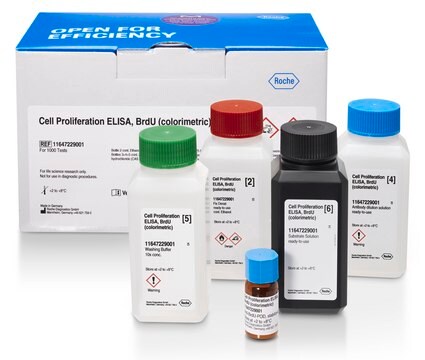N2280
Monoclonal Anti-Nitric Oxide Synthase, Brain (1-181) antibody produced in mouse
clone NOS-B1, ascites fluid
Synonym(s):
Anti-bNOS
Sign Into View Organizational & Contract Pricing
All Photos(1)
About This Item
Recommended Products
biological source
mouse
Quality Level
conjugate
unconjugated
antibody form
ascites fluid
antibody product type
primary antibodies
clone
NOS-B1, monoclonal
mol wt
antigen 150-160 kDa
contains
15 mM sodium azide
species reactivity
rat, goat, pig, human
technique(s)
microarray: suitable
western blot: 1:3,000 using fresh rat cerebellum extract
isotype
IgG1
UniProt accession no.
shipped in
dry ice
storage temp.
−20°C
target post-translational modification
unmodified
Gene Information
human ... NOS1(4842)
rat ... Nos1(24598)
General description
Monoclonal Anti-Nitric Oxide Synthase-Brain (bNOS) (mouse IgG1 isotype) is derived from the NOS-B1 hybridoma produced by the fusion of mouse myeloma cells and splenocytes from immunized BALB/c mice. Nitric oxide synthase (NOS) has been localized in many different cell types. Type I NOS is found in neurons. It is a 150-160 kDa protein, also called NOS-1, neuronal NOS (nNOS), brain NOS (bNOS), cerebral NOS, constitutive NOS or Ca2+- regulated NOS (cNOS). bNOS is present also in skeletal muscle, where it is complexed with dystrophin, and is absent in Duchenne′s muscular dystrophy, which perhaps accounts for symptoms of the disease.
Specificity
Monoclonal Anti-Nitric Oxide Synthase, Brain (1-181) antibody is specific for nitric oxide synthase (NOS) derived from brain (bNOS, 150-160 kDa and several breakdown products of lower M.W.). The product does not bind to NOS derived from macrophages (mNOS) and endothelial cells (eNOS). This antibody is specific for bNOS in humans, goats, pigs and rats.
Immunogen
recombinant neuronal NOS fragment (amino acids 1-181) from rat brain.
Application
Monoclonal Anti-Nitric Oxide Synthase, Brain (1-181) antibody produced in mouse has been used in:
- western blot analysis
- immunocytochemistry
- double immunofluorescence
- immunofluorescence staining
- enzyme-linked immunosorbent assay (ELISA)
- dot blot immunoassay
- immunohistochemical staining
Biochem/physiol Actions
Nitric oxide synthase is an enzyme that catalyzes the formation of nitric oxide. Nitric oxide is responsible for regulating several biochemical functions such as hemostasis, neurotransmission and vascular injury response . Mutations in nitric oxide synthase gene have been associated with diabetic nephropathy.
Disclaimer
Unless otherwise stated in our catalog or other company documentation accompanying the product(s), our products are intended for research use only and are not to be used for any other purpose, which includes but is not limited to, unauthorized commercial uses, in vitro diagnostic uses, ex vivo or in vivo therapeutic uses or any type of consumption or application to humans or animals.
Not finding the right product?
Try our Product Selector Tool.
recommended
Product No.
Description
Pricing
Storage Class Code
10 - Combustible liquids
WGK
WGK 3
Flash Point(F)
Not applicable
Flash Point(C)
Not applicable
Choose from one of the most recent versions:
Already Own This Product?
Find documentation for the products that you have recently purchased in the Document Library.
Elevated expression of CAPON and neuronal nitric oxide synthase in the sciatic nerve of rats following constriction injury
Cui Z, et al.
The Veterinary Journal, 187(3), 374-380 (2011)
B R Schofield
Neuroscience, 159(1), 246-258 (2008-12-17)
A large injection of a retrograde tracer into the inferior colliculus of guinea pigs labeled two bands of cells in the ipsilateral auditory cortex: a dense band of cells in layer V and a second band of cells in layer
K Ashutosh
Current opinion in pulmonary medicine, 6(1), 21-25 (1999-12-23)
Nitric oxide (NO) is synthesized from the amino acid arginine by enzymes called nitric oxide synthases. NO has an important physiologic role in the regulation of vascular tone, response to vascular injury, and hemostasis. It also acts as a neurotransmitter
The complex contribution of NOS interneurons in the physiology of cerebrovascular regulation
Duchemin S, et al.
Frontiers in Neural Circuits, 6 (2012)
Ben Coomber et al.
The European journal of neuroscience, 40(2), 2427-2441 (2014-04-08)
Animal models of tinnitus allow us to study the relationship between changes in neural activity and the tinnitus percept. Here, guinea pigs were subjected to unilateral noise trauma and tested behaviourally for tinnitus 8 weeks later. By comparing animals with tinnitus
Our team of scientists has experience in all areas of research including Life Science, Material Science, Chemical Synthesis, Chromatography, Analytical and many others.
Contact Technical Service